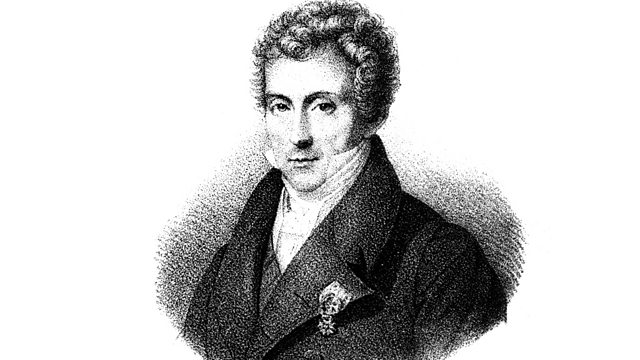
Episode 1
Donald Macleod focuses on Cherubini's roots in Italy, his first trip to London and his first international smash. With Petrus apostolus (1778) and Nemo gaudeat (1781).
"Some maintain his temper was very even, because he was always angry" - that's what the composer Adolphe Adam said about Luigi Cherubini, the man Beethoven named when asked the question, "who is the greatest composer in Europe - apart from you?" Italian by birth, from a modest background, he was singled out early by his prodigious talent, and by 18 he was completing his studies with Giuseppe Sarti, one of the leading Italian opera composers of the day. Operatic commissions followed, and before long he had won enough recognition to receive an invitation to become house composer at the King's Theatre in London's Haymarket. From here it was a short step to Paris, where Cherubini settled at the age of 25; he would remain there for the rest of his life, during which he came to bestride Parisian music like a colossus.
All week, Donald Macleod investigates the life and work of the man often spoken of as "an Italian composer writing German opera for a French audience". He begins by examining Cherubini's Italian roots, with two early choral pieces written under Sarti's tutelage. Then we follow him to London, where he discovers that the title "house composer" really means "house composer of pasticcios" - operatic patchworks stitched together from well-known arias. His one original opera for London, Il Giulio Sabino, was not a success - "murdered in its birth for want of the necessary support of capital singers", as Dr Burney put it. But his first international success was just five years away; Lodoïska was an instant smash in that most momentous of years, 1791, and went on to play to sell-out houses throughout Europe before eventually crossing the Atlantic to New York in 1826.
Last on
More episodes
Previous
You are at the first episode
Music Played
-
![]()
Luigi Cherubini
'Petrus apostolus' (1778)
Performer: Choir of the Bavarian Radio Symphony Orchestra (chorus master: Peter Dijkstra) Riccardo Muti (cond)
- EMI 6 29471 2,.
- 7.
-
![]()
Luigi Cherubini
'Nemo gaudeat' (1781)
Performer: Barbara Fleckenstein (soprano), Barbara Müller (contralto), Bernhard Schneider (tenor 1), Andrew Meyer Performer: (tenor 2), Christoph Hartkopf (bass) Choir of the Bavarian Radio Symphony Orchestra Performer: Harald Feller (organ 1), Max Hanft (organ 2) Riccardo Muti (cond)
- EMI 6 29471 2,.
- 8.
-
![]()
Luigi Cherubini
Sinfonia to Il Giulio Sabino (1786)
Performer: Zurich Chamber Orchestra Howard Griffiths (cond)
- CPO 999 5212,.
-
![]()
Luigi Cherubini
Lodoïska (1791) – Act 3
Performer: William Shimell (Dourlinski), Mariella Devia (Lodoïska), Bernard Lombardo (Floreski), Performer: Mario Luperi (Altamoras), ??? (soldier), Thomas Moser (Titzikan), Francesca Pedaci (Lysinka), Performer: Alessandro Corbelli (Varbel) Orchestra e coro del Teatro alla Scala Riccardo Muti (cond)
- Sony SM2K 93126,.
Broadcasts
- Mon 24 Jan 2011 12:00����ý Radio 3
- Mon 24 Jan 2011 22:00����ý Radio 3
- Mon 30 Apr 2012 12:00����ý Radio 3
- Mon 30 Apr 2012 19:00����ý Radio 3
Beethoven Unleashed – the box set
What was really wrong with Beethoven?
Composers A to Z
Who knew? Five eye-opening stories from Composer of the Week
Five reasons why we love Parry's Jerusalem
What is the strange power of Jerusalem which makes strong men weep?
A man out of time – why Parry's music and ideas were at odds with his image...
The composer of Jerusalem was very far from the conservative figure his image suggests.
Composer Help Page
Find resources and contacts for composers from within the classical music industry.





